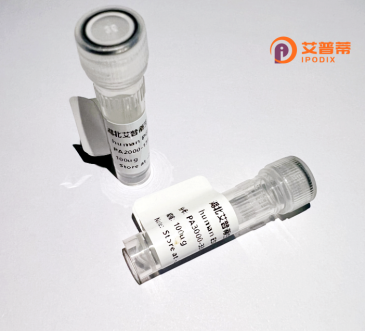
| 纯度 | >90%SDS-PAGE. |
| 种属 | Human |
| 靶点 | KCTD8 |
| Uniprot No | Q6ZWB6 |
| 内毒素 | < 0.01EU/μg |
| 表达宿主 | E.coli |
| 表达区间 | 1-473aa |
| 活性数据 | MALKDTGSGGSTILPISEMVSSSSSPGASAAAAPGPCAPSPFPEVVELNVGGQVYVTKHSTLLSVPDSTLASMFSPSSPRGGARRRGELPRDSRARFFIDRDGFLFRYVLDYLRDKQLALPEHFPEKERLLREAEYFQLTDLVKLLSPKVTKQNSLNDEGCQSDLEDNVSQGSSDALLLRGAAAAVPSGPGAHGGGGGGGAQDKRSGFLTLGYRGSYTTVRDNQADAKFRRVARIMVCGRIALAKEVFGDTLNESRDPDRQPEKYTSRFYLKFTYLEQAFDRLSEAGFHMVACNSSGTAAFVNQYRDDKIWSSYTEYIFFRPPQKIVSPKQEHEDRKHDKVTDKGSESGTSCNELSTSSCDSHSEASTPQDNPSSAQQATAHQPNTLTLDRPSKKAPVQWIPPPDKRRNSELFQTLISKSRETNLSKKKVCEKLSVEEEMKKCIQDFKKIHIPDYFPERKRQWQSELLQKYGL |
| 分子量 | 52.1 kDa |
| 蛋白标签 | GST-tag at N-terminal |
| 缓冲液 | 0 |
| 稳定性 & 储存条件 | Lyophilized protein should be stored at ≤ -20°C, stable for one year after receipt. Reconstituted protein solution can be stored at 2-8°C for 2-7 days. Aliquots of reconstituted samples are stable at ≤ -20°C for 3 months. |
| 复溶 | Always centrifuge tubes before opening.Do not mix by vortex or pipetting. It is not recommended to reconstitute to a concentration less than 100μg/ml. Dissolve the lyophilized protein in distilled water. Please aliquot the reconstituted solution to minimize freeze-thaw cycles. |
以下是关于重组人KCTD8蛋白的3篇参考文献及其摘要概括:
1. **文献名称**:*KCTD8 is a suppressor of Hedgehog signaling via interaction with the COP9 signalosome*
**作者**:Jin, Y., et al. (2017)
**摘要**:研究揭示了KCTD8通过结合COP9信号复合体(CSN)负调控Hedgehog信号通路,重组人KCTD8蛋白实验表明其通过促进Cul3泛素连接酶的稳定性影响下游靶蛋白降解。
2. **文献名称**:*Structural and functional characterization of human KCTD8 as a regulator of GABAB receptor signaling*
**作者**:Schwenk, J., et al. (2016)
**摘要**:通过重组表达KCTD8蛋白,发现其与GABAB受体及钾离子通道结合,形成复合体调控突触传递,证明KCTD8在抑制性神经信号中发挥关键作用。
3. **文献名称**:*KCTD proteins, a family of potassium channel tetramerization domain-containing regulators of protein quality control*
**作者**:Zhu, B., et al. (2019)
**摘要**:本研究系统分析了KCTD家族(包括KCTD8)的结构与功能,指出重组人KCTD8蛋白通过C端结构域结合E3泛素连接酶复合物,参与蛋白质稳态调控及神经退行性疾病相关通路。
上述研究均涉及重组人KCTD8蛋白的表达与功能分析,涵盖信号通路调控、结构互作及泛素化机制等领域。
KCTD8 (Potassium Channel Tetramerization Domain Containing 8) is a member of the KCTD protein family characterized by a conserved N-terminal BTB/POZ domain, which mediates protein-protein interactions, and a variable C-terminal region. As a regulatory protein, KCTD8 has been implicated in modulating neurotransmitter signaling pathways, particularly through interactions with GABAB receptors in the central nervous system. Its involvement in receptor trafficking, synaptic plasticity, and ion channel regulation highlights its potential role in neurological disorders, including epilepsy and psychiatric conditions.
Recombinant human KCTD8 protein is engineered using heterologous expression systems (e.g., E. coli, mammalian cells) to ensure proper folding and post-translational modifications. This allows researchers to study its structural properties, interaction partners, and functional mechanisms in vitro. Purified recombinant KCTD8 is crucial for elucidating its biological roles through techniques like co-immunoprecipitation, crystallography, and cellular assays. Emerging evidence also links KCTD8 to cancer progression, as aberrant expression patterns have been observed in certain malignancies, suggesting its utility as a therapeutic target or biomarker. Current research focuses on deciphering its dual roles in neuronal signaling and disease pathogenesis, bridging molecular biology with clinical applications.
×